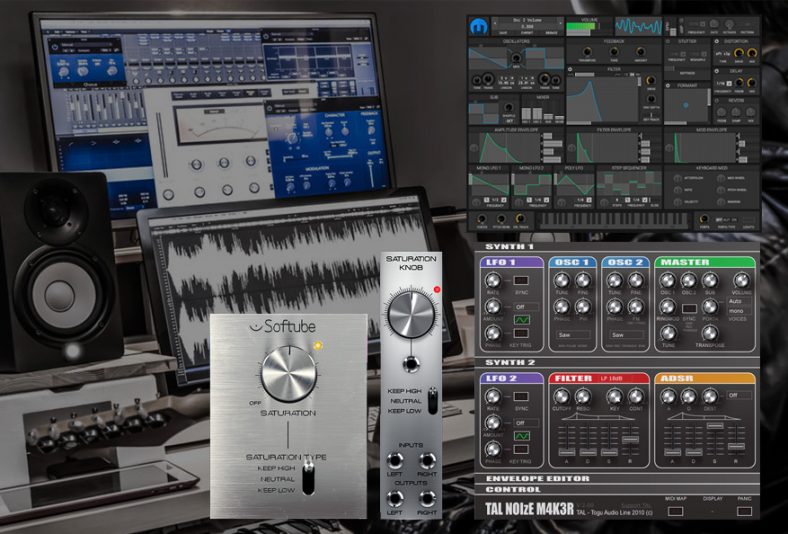How to Use 32-Bit VST Plugins in a 64-Bit DAW

The computing world has moved to the 64-bit standard, but some older plugins in your collection might still only run on 32-bit. Some DAWs such as FL Studio and Reaper will automatically load 32-bit plugins using a “bridge”. Let us take a look at why some of your plugins do not work and what you can do to fix the problem.
To put it simply, computers use two main types of processing: 32-bit and 64-bit. This refers to the amount of memory (RAM or physical access memory) a processor can access to run an application. 64-bit Computers became standard around 2008 (quite a long time ago when it comes to technology!).
Contents
At A Glance
- 32-bit VSTs won’t work on 64-bit DAWs by default, however, many developers have created newer 64-bit versions of their VSTs with which you can replace the former with.
- Alternatively, you can use bridge plugins such as jBridge or Bitbrigde to bridge your 32-bit plugins to your 64-bit DAW.
- Another option is to find similar-sounding 64-bit VSTs that resemble the 32-bit ones you want to replace.
- FL Studio (Windows version), Cubase 4 to 8.5 (Windows version) 6 to 8.5 (Mac version), Nuendo 4 to 7, and Reaper are DAWs that automatically bridge and support 32-bit plugins.
- Bridging plugins is not always a guarantee and may not be as reliable as natively run plugins.
Why 32-bit VSTs Don’t Work On 64-bit DAWs By Default
Many DAWs do not automatically bridge 32-bit VSTs. Therefore, if you have a 32-bit VST or plugin and your DAW is running on 64-bit, the DAW will not load the plugin and thus you will not be able to use it.
Developers of almost all popular plugins have created newer 64-bit versions that you can replace them with. If that’s not the case, you can use a bridge plugin (such as jBridge) that will bridge your 32-bit plugin so that it will work in your 64-bit DAW.
Of course, you can alternatively just try to find another plugin with a similar sound, but of course, certain VSTs have very distinct sounds and one cannot simply replace them with something else.
How To Get 32-Bit VSTs To Work On 64-Bit DAWs

Steinberg, the original makers of VSTs as we know them today, and audio workstations such as Cubase and Nuendo, recommends that we either replace the VSTs with compatible ones. But this can be problematic if the plugin developers never released 64-bit versions.
Alternatively, you can also use jBridge. This is software designed for Windows that bridges 32-bit VSTs and plugins for 64-bit DAWs and even 32-bit hosts, which overcomes the memory limitations of a single 32-bit process. Although this software is not officially supported by Steinberg, they do recommend it and musicians who use this will tell you that it does get the job done for a small fee.
DAWs That Support 32-bit Plugins
The Windows version of FL Studio is an example of a DAW with an auto-bridge. This means that your 32-bit plugin will automatically be converted to a 64-bit one when you try to open it in the DAW.
Cubase 4 to 8.5 and Nuendo 4 to 7 also have a VST bridge, which makes the conversion and transition to 64-bit seamless. On a Windows machine, you can install both 32 and 64-bit versions. However, on a Mac computer, only Cubase 6 up to 8.5 has this feature.
Reaper, too, has an internal bit bridge that can run 32-bit VSTs.
Problems With Bridging 32-bit Plugins
jBridge has been recommended by many musicians and music producers. However, since it is a third-party software at the end of the day, most companies making DAWs or plugins will not officially guarantee that it runs seamlessly. Using third-party software is solely at your discretion.
Also, one of the bigger problems of bridging a 32-bit plugin to work on a 64-bit DAW is that it may not be as reliable as natively run plugins.
Should I Use 32 or 64-bit?
If you’re using a 64-Bit DAW then use 64-Bit plugins. If you’re using a 32-Bit DAW then try to use 32-Bit Plugins whenever you can.
If you are using an updated or newer version of any DAW, it is probably already 64-bit. Most of the newer plugins and VSTs are in 64-bit. Older plugins were generally 32-bit because that used to be the standard.
Summary
Music technology has come a long way because there have been rapid advancements in the field of computers and computer technology. While 32-bit was the norm for DAWs and plugins, this has changed.
Although most have already been in 64-bit, there is a slight possibility that the makers of your favorite plugin still have not. But the good news is that you can always use third-party software such as jBridge or Bitbridge to fix that!





